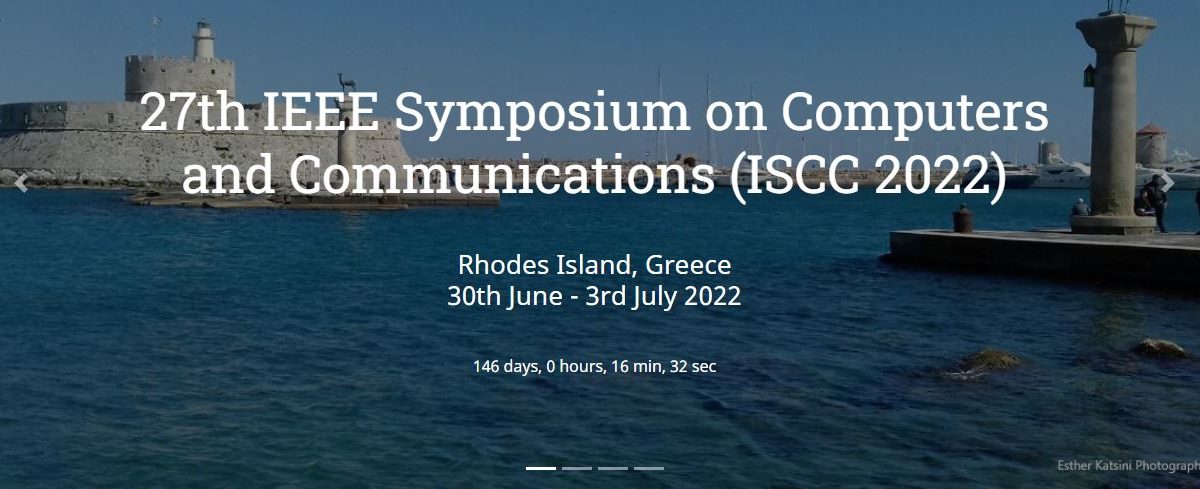Welcome to the 27th IEEE Symposium on Computers and Communications (ISCC).
The first IEEE Symposium on Computers and Communications (ISCC) was held in 1995 in response to the growing interaction between the fields of computers and communications.ISCC takes place annually, usually in the Mediterranean region, in locations such as Egypt, Greece, France, Tunisia, Portugal, Spain, Morocco, Italy, and Brazil. In 2022, the Symposium is going to take place in Rhodes Island, Greece.ISCC sessions will include presentations on new research results and tutorials. Papers describing original works are invited in any of the computer and communications areas covered by the Call for Papers. Accepted papers will be included in the ISCC 2022 Conference Proceedings, which will be subject to independent peer-review procedures for quality, and may be eligible for inclusion in the IEEE Xplore® Digital Library. Merit, relevance, and originality will guide paper acceptance. Best Paper Award and Best Student Paper Awards will be presented.===========================Important Dates===========================Paper submission deadline : February 7th, 2022Notification of paper acceptance: April 15th, 2022Submission of camera-ready papers due: May 6th, 2022Conference Dates: end of June / beginning of July 2022===========================Call for Papers===========================ISCC 2022, in its 27th edition, will provide an insight into the unique world stemming from the interaction between the fields of computers and communications. ISCC 2022 will provide an international technical forum for experts from industry and academia to exchange ideas and present results of on-going research in most state-of-the-art areas of computers and communications. You are invited to submit a full paper, a proposal for a Panel/Invited Session or a Tutorial, related to the following topics of interest:
5th Generation Networks (5G) Resource AllocationNetwork SlicingTopology Management5G Core Network and Service Based ArchitectureC-RAN and backhaulSDN and NFV for 5GNetwork Stability, Control and OptimizationStandardization Activities by IEEE, 3GPP and ETSISecurity and PrivacyPrivacy / AnonymityAttacks and DefensesAuthentication, Authorization and AccountingHardware SecurityIntrusion DetectionMoving Target Defense (MTD)BlockchainInternet of Things (IoT)LPWAN (LoRa, Sigfox, NB-IoT, LTE-M, Wi-SUN)6TiSCH, 6LoWPAN, RollRest API, CoAP, CBOR, OSCOREOperating SystemsInteroperability of IoT protocols and devicesSimulation, emulation and testbed supportSmart Spaces: design and applicationsCyber Physical SystemsTelecare Medical Information SystemTinyML designed for microcontrollers and IoT-ready devicesVehicular NetworksIntelligent Transport Systems (ITS)IEEE 802.11p ITS-G5Millimeter WavesV2X, V2I, V2N, V2V, V2P, V2D, V2GInter and intra vehicle communication and protocolsSoftware Defined *Software Defined Networks and Network Function VirtualizationSoftware Defined Smart ObjectsSoftware Defined Data CentersSoftware Defined RadioOverlay and Programmable NetworksArtificial Intelligence (AI)Artificial Intelligent Systems applications in Computers and CommunicationsAI TechnologiesGame TheoryMachine and Deep Learning of KnowledgeBio-inspired Computing in CommunicationsData Science and Data EngineeringDistributed Knowledge and ProcessingCloud and Edge ComputingCloud Computing (IaaS, PaaS, and SaaS)Mobile Cloud and Mobile Cloud NetworkingFog ComputingDistributed Systems Architecture and ManagementWireless NetworksCognitive Radio NetworkingWireless, Cellular, and Mobile CommunicationsModeling and SimulationSignal Processing for CommunicationsServices and ProtocolsAdvances in Internet ProtocolsGreen NetworkingReal Time Communication ServicesRouting and MulticastNetwork Design, Optimization and ManagementNetwork Reliability, Quality of Service and Quality of ExperienceFault-Tolerance and Error RecoveryWeb Services and Service Oriented ArchitecturesStandards EvolutionDigital Satellite Communications ServiceLocalisation ProtocolsCommunications Services and ManagementCrowdsourcing applications, Crowdsensing and Mobile CrowdSensingSocial NetworksOptical NetworksOptical Network Protocols and ArchitecturesEnergy-efficient/green Optical Communications and NetworksVisible Light Communications (Indoor, Outdoor and Localization)Optical Wireless Communication Applications for Future NetworksApplication domain / Framework / Architecturee-Health and BioinformaticsSmart GridSmart CityIndustry 4.0Smart BuildingSoftware EngineeringPeer-to-Peer ComputingComputing applicationsBig Data, Data Mining and Database Applications===========================Submission Guidelines===========================Papers must be submitted electronically as a PDF file through theconference management system, at:https://edas.info/N29322Please note:(1) All papers will be reviewed by the Technical Program Committee onthe basis of technical quality, relevance, originality, significance,and clarity. All paper submissions will be handled electronically.Papers that do not comply with the Submission Guidelines will berejected without review.(2) All papers should be submitted electronically in PDF and be nolonger than 7 pages in the IEEE double column proceedings formatincluding tables, figures and references. Papers exceeding 7 pages willnot be accepted. Download manuscript templates for IEEE conferenceproceedings: https://www.ieee.org/conferences/publishing/templates.html(3) Best Paper Award and Best Student Paper Awards will be presented.(4) Accepted papers up to 6 pages will be published with no additional charge. Exceeding page(s) will be charged an additional fee.(5) At least one author of each accepted paper is required to register to the conference and present the paper. Only registered and presented papers will be published in the conference proceedings. Accepted papers will be included in the ISCC 2021 Proceedings and will be submitted for inclusion to IEEE Xplore.The ISCC Proceedings have been indexed in the past by ISI, dblp and Scopus. This makes the ISCC conference one of the publication venues with very high visibility and impact in both Computer and Communications areas.

